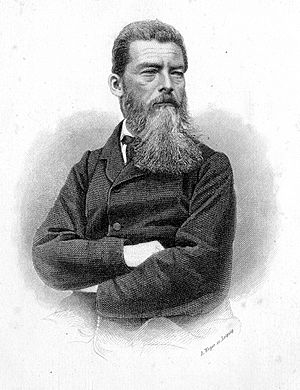Naturalism (philosophy) facts for kids

Naturalism is a way of thinking that believes only the natural world exists. It means everything we see, touch, and learn about is part of nature. This idea suggests there's nothing beyond what we can observe or study in the natural world. The word "naturalism" was first used this way in English around 1750.
This philosophy covers everything about reality. It says that nature is all there is, and all basic truths come from nature itself. Things often called "supernatural," like God, souls, or witchcraft, are not believed to exist in naturalism.
How Scientists Use Naturalism
Methodological naturalism or scientific naturalism is about how we gain knowledge. It focuses on practical ways to learn about the world.
Many scientists use the scientific method for their research. When they form hypotheses (ideas to test), they explain and test them using only natural causes and events.
Scientists who follow naturalism believe that explanations for what they observe are only useful if they are based on natural causes. An explanation that uses natural rules and mechanisms is helpful. But explanations that need miracles to work are not considered useful in science.
Methodological naturalism is a key idea behind all modern science. Some thinkers even extend this idea to all of philosophy. They believe science and philosophy are connected. Philosophers like W.V. Quine and George Santayana supported this view.
Other ideas similar to naturalism include:
See also
 In Spanish: Naturalismo (filosofía) para niños
In Spanish: Naturalismo (filosofía) para niños
 | Jackie Robinson |
 | Jack Johnson |
 | Althea Gibson |
 | Arthur Ashe |
 | Muhammad Ali |

